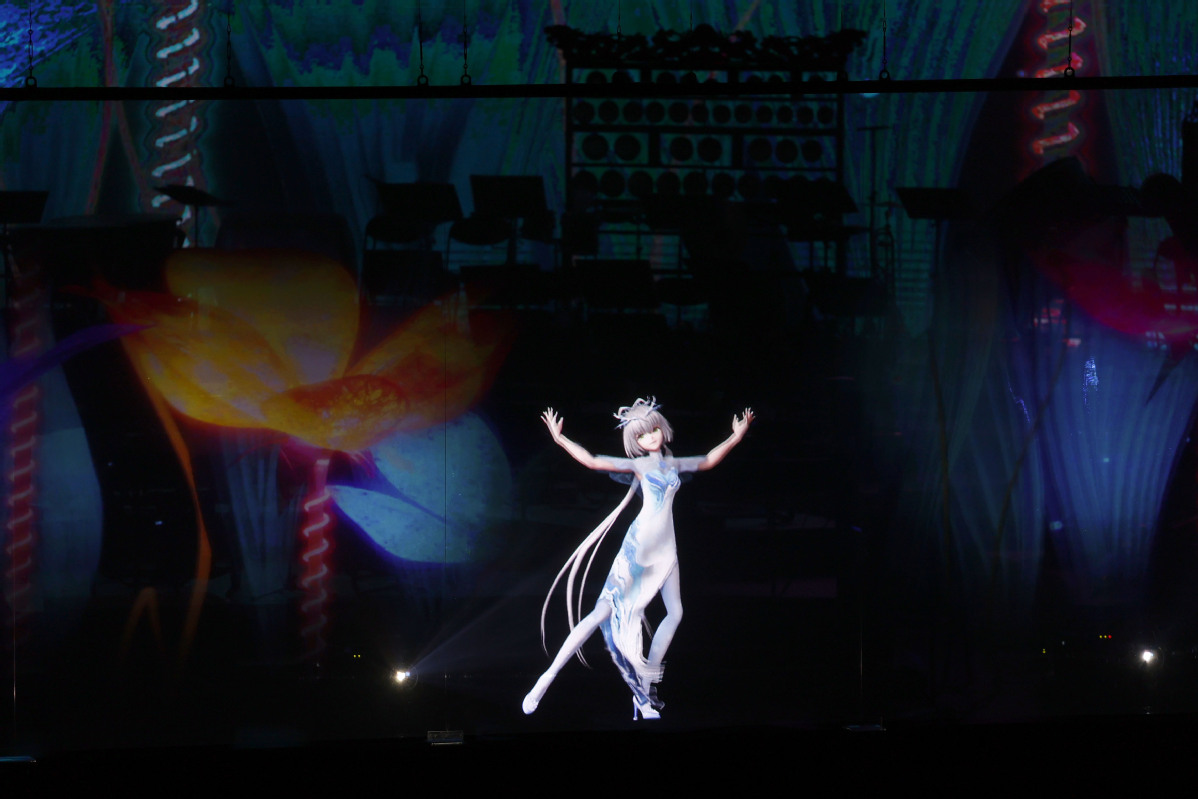Digital influencers captivate Gen Z attention
By FAN FEIFEI | China Daily | Updated: 2022-09-21 10:19

Just three days after Liu Yexi made her debut on Chinese short video app Douyin, she attracted 2.3 million followers. In her first video clip, which lasted about two minutes, the virtual beauty blogger sat in a neon-lit alley and did her makeup in a mirror while dressed like a Taoist priest.
The video, which combined traditional Chinese cultural elements, science fiction elements and special visual effects with a cyberpunk style, stunned Chinese netizens. So far, Liu has posted 20 videos and gained more than 8 million followers.
The catch, however, is that Liu is not a real person but a virtual avatar developed by Shenzhen Chuangyi Technology and Culture Co Ltd, a company dedicated to creating visual content and digital avatars. Her popularity online reflects the fact that the virtual idol industry is booming in China.
Virtual idols are artificial intelligence-powered digital characters that bear a close resemblance to real humans. As more and more young people become captivated by these virtual idols, their commercial value is also rising.
A growing number of brands are looking to use virtual idols in advertisements, livestreaming and other marketing campaigns, in the hopes that they will increase brand awareness and lure more young consumers.
For instance, world-renowned virtual influencer Lil Miquela began appearing alongside real human celebrities in online advertisements and TV commercials in 2016, and has since gained over 3 million Instagram followers. She has worked with world-renowned luxury brands like Fendi, Off-White and Prada.
China's first virtual influencer Ayayi, who debuted on social media platform Xiaohongshu in May 2021 and garnered over 20,000 followers overnight, has attracted the attention of brands such as Louis Vuitton and Guerlain. Other luxury brands like Dior and L'Oreal have developed their own in-house virtual idols.
Compared with real idols and stars, virtual avatars, who, like their flesh-and-blood counterparts, can sing, dance and promote products through livestreaming, seem more approachable to fans, and are not likely to be mired in scandals, industry experts said.
These virtual brand ambassadors can be present at multiple events simultaneously and at the brand's disposal 24 hours a day, seven days a week. They provide the additional possibility for followers to interact with them one-on-one.
According to data from online market research and business intelligence portal Statista, the scale of China's virtual idol market reached 6.22 billion yuan ($887.3 million) in 2021, bringing an extra value of 107 billion yuan to other sectors. The figure is projected to reach 20.52 billion yuan in 2023.
About 92.3 percent of virtual idol fans are aged between 19 and 30 years old, and 80 percent of followers spend less than 1,000 yuan per month on virtual idols, according to market consultancy iiMedia Research.
Zhang Yi, CEO and principal analyst at iiMedia Research, said virtual idols can subtly convey brand concepts in the process of interacting with users, and have been increasingly applied in a wide range of fields, such as product promotion, livestreaming, concerts, commercial performances, gaming and broadcasting.
Zhao Zhanling, a legal adviser for the Internet Society of China, said Generation Z-those born between the mid-1990s and the early 2010s-has become a major force in the consumption market and is more receptive to virtual idols. "For brand owners, utilizing popular virtual idols as brand spokespersons could enhance consumer perceptions and improve their sense of trust toward products," Zhao said.
In addition, a series of celebrity scandals in recent years have made brands pay more attention to risk management. Zhao said there are many uncontrollable factors involving human celebrities, while such risks do not exist in choosing virtual idols for brand endorsement.
"With continuous advances in intelligent technologies such as motion capture technology, the production cost of virtual idols will be greatly reduced, which will give a big boost to their popularization," said Wang Fei, associate professor at the School of Journalism, Renmin University of China.
Motion capture technology is a process by which movement is digitally recorded and has become an essential tool in the entertainment business, giving computer animators the ability to make nonhuman characters more lifelike.
In addition, China's Gen Z consumers have been profoundly affected by ACGN (anime, comics, games and novels) culture. They possess a yearning for virtual culture and interaction experience with virtual symbols, so virtual idols can meet user demand for companionship and a sense of belonging, Wang said.
However, the virtual idol market in China is still in its early stages. Zhang, the iiMedia Research CEO, called for better supervision of virtual idols and the improvement of relevant laws and regulations.
























